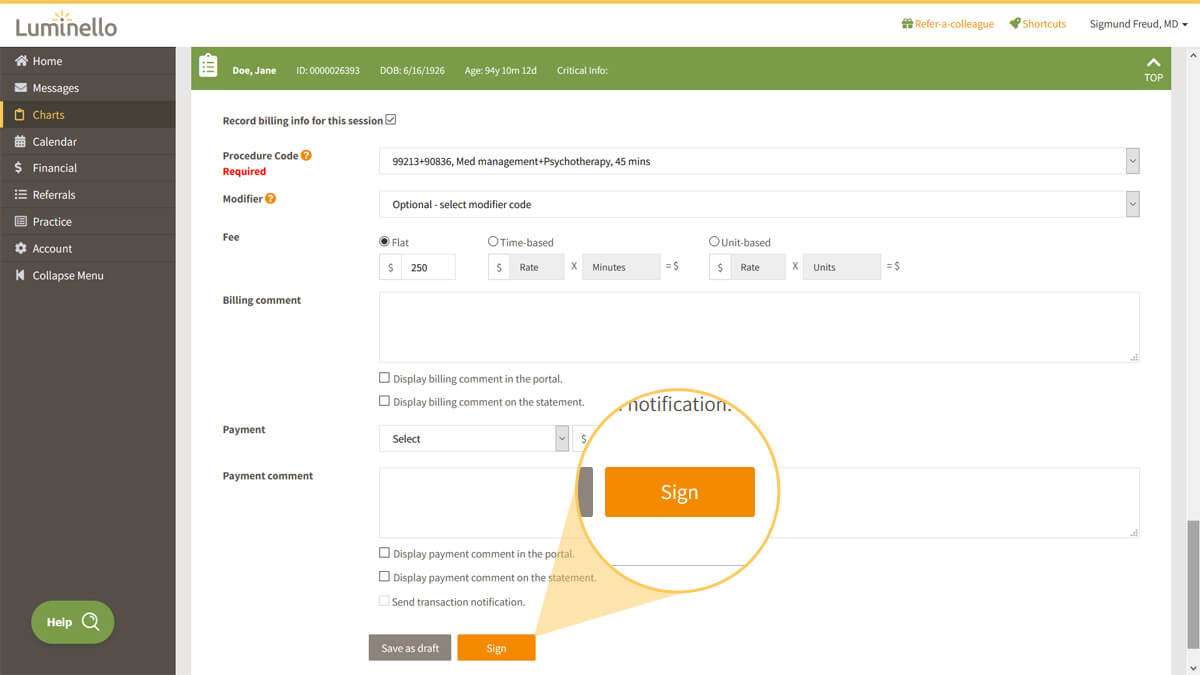Interpersonal psychotherapy is a relatively new therapy that was developed as a research intervention, and until recently, most practitioners of IPT were researchers. Its research success has led to its inclusion in clinical treatment guidelines and growing interest among clinicians, but the standards for clinical training for non-researchers are still being defined. The International Society for Interpersonal Psychotherapy, an international umbrella organization, deliberates training concerns and allows countries to develop their own credentialing processes for interpersonal psychotherapy.
A therapist should help the patient identify any interpersonal issues he or she wants to address, and rank them in order of importance. The therapist should also offer support regarding clarification of issues, communication analysis, and supportive listening.
This therapist can be found in clinics, private practice, and other settings and institutions.
Screen your potential therapist either in person or over video or phone. During this initial introduction, ask the therapist:
-
How they may help with your particular concerns
-
If they have dealt with this type of problem before
-
The process and timeline for treatment
Interpersonal therapy (IPT) is a type of psychotherapy that aims to cultivate strong attachments. Research suggests that it can help improve the symptoms of several mental health conditions.
IPT is a form of psychotherapy that can treat depression and some other mental health issues.
Two psychotherapists developed it in the 1970s to help with depression, and clinicians have since used it to treat a variety of mental health issues. Learn more in this article.
What is it?

Share on Pinterest
Maskotx/Getty Images
IPT is a short-term form of therapy that usually lasts for fewer than 12–16 weeks. It focuses on cultivating communication and interpersonal effectiveness skills; practitioners believe that many mental health issues stem from relational deficits or role conflicts.
IPT practitioners endorse the notion of depression and other mental health conditions as real illnesses requiring treatment. They focus on this in therapy to prevent clients from blaming themselves for their challenges.
Proponents of IPT also argue that mood and life situations, especially relationships, are closely related. Improving relationships can improve a person’s mental health.
In IPT sessions, a person learns and practices skills that may help heal relationships and prevent the development of additional relationship issues.
How does it work?
IPT is a structured type of therapy, which means that treatment progresses in three distinct phases.
During the first one to three sessions, a therapist will diagnose the issue and help the client identify the interpersonal issues that preceded or maintained the psychological distress.
For example, a person going through a breakup might notice that their depression developed after the breakup. The therapist will also develop an “interpersonal inventory” that reviews the client’s pattern of behavior in relationships and evaluation of current relationships.
IPT therapists believe that four areas of conflict typically trigger relationship and mental health issues. These are:
- relationship conflicts that cause stress
- life changes that alter a person’s role or relationships
- difficulty beginning or maintaining relationships
- grief or loss
Once the therapist and their client identify the area of conflict that causes the latter’s distress, therapy will focus on managing this conflict.
During the middle portion of treatment, the therapist will develop targeted relationship strategies to bolster interpersonal functioning. For example, they might help a client who is going through a breakup mourn the relationship and the role it represents, then help them cultivate new skills and ways of relating to others.
In the final weeks of treatment, the therapist will remind the client that treatment will be ending soon, and they will help them practice their new skills.
Some therapists use a combination of IPT and other therapies. When this is the case, IPT may last longer or be less formulaic.
As with all forms of therapy, the therapist will encourage the client to discuss their emotions, identify patterns in their behavior, and be open about their goals for treatment. The therapist must also keep the client’s information private.
Research consistently suggests that IPT works well for depression — especially depression related to relationship issues.
More recent research has started to test IPT for other psychological issues. For example, a 2020 study of family caregivers of people with schizophrenia found that IPT coupled with psychoeducation could help improve self-efficacy and reduce the family’s care burden.
Origins
In the 1970s, psychotherapists Myrna Weissman and Gerald Klerman developed IPT to treat mood disorders such as depression. They drew upon the research of John Bowlby and Mary Ainsworth, who studied the role that attachments, especially in early life, play in relationships.
IPT practitioners highlight research showing that social factors, such as the loss of a relationship, are often major factors in the onset and maintenance of depression.
Drawing on these data, Weissman and Klerman used IPT to treat depression and other mood issues. Since then, researchers have shown that IPT can also treat social phobia, anxiety disorders, post-traumatic stress disorder, and eating disorders.
IPT vs. other types of therapy
Most research shows that IPT works about as well as other types of therapy. In some cases, it even seems to provide better results.
A 2005 meta-analysis of IPT for the treatment of depression looked at studies that compared IPT with a placebo and with cognitive behavioral therapy (CBT). IPT was more effective than CBT and placebo, and it offered similar results to medication.
A much larger 2016 meta-analysis assessed the effectiveness of IPT for various mental health issues. Drawing on data from 90 studies, the researchers found no significant difference between IPT and other clinically evaluated studies.
IPT was effective in treating depression, eating disorders, and similar issues, though the study suggests that CBT is likely more effective in the early stages of eating disorder treatment.
IPT builds upon many theories, including attachment theory. Therefore, its methods are similar to those of some other approaches. For example, emotionally focused therapy also prioritizes attachments and human relationships.
Learn more about different types of therapy here.
Strengths and weaknesses
Some strengths of IPT include:
- a focus on relationships, communication skills, and life situations rather than viewing mental health issues as things that occur in a vacuum
- a structured, formulaic approach that makes it easier to track progress
- an ability to build a strong relationship with the therapist, which may enable the client to test new skills
Research has consistently shown that IPT works well for depression and relationship transitions and conflict. Although many studies have shown that IPT works well for some other issues, the evidence there is less consistent, and some other therapies may work better.
One potential weakness of IPT is its shorter timeline, which may not offer enough support for people with chronic or relapsing mental health issues. That said, IPT practitioners recognize that maintenance sessions may be necessary for recurring symptoms.
Also, its formulaic approach may mean that therapy does not offer relief if a person drops out early or cannot pay for continued treatment.
Summary
Like all forms of psychotherapy, IPT can empower a person to change the way they think about and interact with others.
The focus on relationships may be especially helpful for those grieving lost relationships or struggling to make their relationships work.
For people with depression, IPT is a highly effective treatment option that may be an alternative to medication.
No matter which treatment a person chooses, it is important to work with a licensed mental health counselor with experience in treating the specific issue for which the person seeks care.
Interpersonal therapy, or IPT, is a short-term, focused treatment for depression. Studies have shown that IPT, which addresses interpersonal issues, may be at least as effective as short-term treatment with antidepressants for mild to moderate forms of clinical depression. Originally developed to treat depression in adults, it has been shown to be effective in treating adolescent depression and is commonly recommended as a treatment for depression in children.
Events surrounding interpersonal relationships do not cause depression. But depression occurs within an interpersonal context and affects relationships and the roles of people within those relationships. By addressing interpersonal issues, interpersonal therapy for depression puts emphasis on the way symptoms are related to a person’s relationships, including family and peers.
The immediate goals of treatment are rapid symptom reduction and improved social adjustment. The long-term goal is to enable people with depression to make their own needed adjustments. When they can do that, they are better able to cope with and reduce depressive symptoms.
What Is Interpersonal Therapy?
Interpersonal therapy (IPT) is a short-term form of psychotherapy, usually 12 to 16 sessions, that is used to treat depression and other conditions. As its name suggests, IPT focuses on your interpersonal relationships and social interactions—including how much support you have from others and the impact these relationships have on your mental health.
When IPT was first developed, many mental health professionals conceptualized depression as “person-based.” That is, depression was not considered to be based on a person’s environment. IPT, on the other hand, recognizes that a person’s relationships can have a huge impact on mental health.
Types of Interpersonal Therapy
There are a couple of different adaptations of interpersonal therapy that you may encounter, including dynamic and metacognitive.
Dynamic Interpersonal Therapy
Dynamic interpersonal therapy (DIT) is also sometimes referred to as psychodynamic interpersonal therapy or mentalization-based therapy. DIT is designed to help you better understand your own thoughts and feelings, as well as the thoughts and feelings of others. It generally consists of 16 sessions over the course of five months.
Metacognitive Interpersonal Therapy
Metacognitive interpersonal therapy (MIT) is an integrative approach to address personality disorders with prominent emotional inhibition (holding back your emotions) or avoidance. One 12-week study found that engaging in MIT helped reduce depression symptoms and improve the ability to identify emotions.
Interpersonal therapy is also sometimes used in a modified form of couple’s therapy, such as when marital troubles are contributing to depression.
Techniques
Because IPT takes the approach of improving depression by improving relationships, it begins with the therapist conducting an interpersonal inventory. This inventory is a detailed review of your significant relationships, both current and past. These relationships are then grouped according to four main problem areas.
Grief
Depression can occur as a result of the loss of a loved one. While it is normal to go through the stages of grief in this type of situation, a major loss can also result in unresolved grief. This is grief that is delayed (remains for a long time after the loss), distorted, or grief in which you may not feel emotions, but instead experience other symptoms related to depression such as insomnia and fatigue.
Role Dispute
Role disputes occur when you and the significant people in your life have different expectations about your relationship. An example of this is if you feel that your spouse should display more affection or ask more questions about your day. The disconnect between expectations and real-life behavior can cause feelings of depression.
Role Transition
Depression may occur during life transitions, when your role changes and you don’t know how to cope with that change. Getting married, getting divorced, becoming a parent, and retiring are all examples of role transitions.
Interpersonal Deficits
If you find it difficult to form and maintain good quality relationships, IPT can help identify your interpersonal deficits. This can include any feelings of inadequacy you may have, whether you find it difficult to express your emotions, and other feelings or beliefs that are preventing you from communicating effectively.
Your therapist can help you determine which area is the most responsible for your current problems. Therapy is then directed at helping you deal with this specific interpersonal issue.
What Interpersonal Therapy Can Help With
IPT was originally created to be a short-term treatment for depression. However, it has also been shown to be an effective treatment for a number of other conditions including:
It may also be helpful for dealing with attachment issues, grief, life adjustment and transitions, and relationship conflicts,
Benefits of Interpersonal Therapy
Interpersonal therapy can have a number of important benefits, including:
- Improved relationships: IPT can help patients understand how their relationships affect their life. The goal is two-fold: to help patients function better socially and to reduce their feelings of depression.
- Decreased depression: This form of psychotherapy is based on the notion that depression occurs in the context of relationships. In other words, your relationships can potentially increase or decrease your depression, and feeling depressed can impact your relationships. As such, the goal of IPT is to relieve your depressive symptoms by improving the way you interact with others.
Unlike some of the other forms of psychotherapy for depression, IPT does not attempt to delve into your inner conflicts resulting from past experiences. Rather, it focuses primarily on your current relationships, how they may be impacting your depression symptoms, and ways that you can improve your interactions for a healthier state of mind.
Interpersonal therapy recognizes that depression is not always a “person issue,” but can also be caused by relationship issues.
Press Play for Advice On Reducing Depression
Hosted by Editor-in-Chief and therapist Amy Morin, LCSW, this episode of The Verywell Mind Podcast shares how you can use behavioral activation to reduce your depression. Click below to listen now.

Subscribe Now: Apple Podcasts / Spotify / Google Podcasts
Effectiveness
IPT has been found to be effective for treating different types and severity of depressive disorders as well as other mental health conditions. This type of therapy may be best when combined with medication in certain circumstances.
- A 2013 review of the research found that IPT was as effective as CBT for the treatment of major depressive disorder and could be recommended as a first-line treatment for the condition.
- Some research has found that interpersonal therapy can help prevent the development of major depression. Engaging in IPT regularly may also help prevent depression relapses.
- Research has also found that IPT showed significant effects in the treatment of eating disorders, anxiety disorders, substance use disorders, as well as other mental health conditions.
- Engaging in IPT as a couple has been found to improve depression and reduce relationship issues.
Things to Consider
While IPT can be an effective and appealing treatment option, it may not be the best choice for everybody. Motivation plays a pivotal role in the treatment process; it can be difficult to create change if a person is not motivated or is unwilling to examine and address the role they play in their relationships.
It is also important to note that conditions such as depression and eating disorders may be recurrent conditions. Even after initial treatment, you may need maintenance sessions to help prevent relapse, reinforce skills, and maintain progress. This might involve a monthly session to brush up on skills or address changes in your life.
How to Get Started
You should expect your treatment to last for approximately 12 to 16 weeks. Sessions are structured and involve regular assessment, therapist interviews, and homework assignments.
During your first few appointments, your therapist will learn more about you, your symptoms, and your relationship history. Next, you will work with your therapist to address specific problem areas. The strategies used can be adapted as treatment progresses, so your goals, assignments, and sessions may change as your therapist continues to assess your progress.
IPT is available in a variety of formats ranging from individual to group sessions, and sessions in which you can either participate in person or through online therapy.
It may also be beneficial to combine IPT with other depression treatments. For example, research shows that combining therapy with medication is often more effective than doing either one on its own.
Interpersonal therapy can help effectively treat depression and other mental health conditions by focusing on aspects of your relationships that might be fueling your condition. In some cases, it may even be helpful to bring significant others into the therapy process directly. Your doctor can help you determine whether IPT is right for your needs, as well as if it would work better if combined with other treatments.




